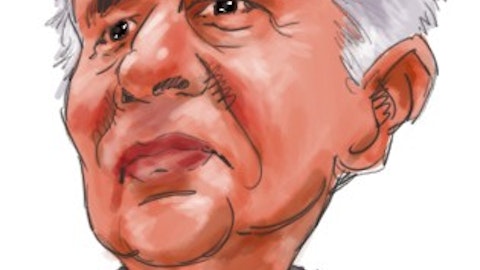Recently, Pfizer (NYSE:PFE) announced that it had completed its acquisition of Hospira. Hospira is one of the world’s leading providers of injectable drugs and infusion technologies, and it is a leader in the production of biosimilars. This marks the continuation of Pfizer’s strategy towards a trend that has been popular as of late with large pharmaceutical giants fighting to stave off the effects of blockbuster patent expiry. Hospira adds to Pfizer a portfolio of low-cost generic medications and technologies, including partnerships for improving patient and caregiver cost and effectiveness.
The Hospira acquisition wasn’t enough for Mason Capital to keep its stake in PFE as the fund liquidated its 6.86 million share position according to latest filings. Fisher Asset Management, on the contrary, slightly increased its previous position by 2% to 31.8 million shares. Insider Monkey, whose research shows that keeping an eye on these funds’ long positions is instrumental in generating alpha, shows that Fisher was the top holder of PFE shares among hedge funds. Like Fisher, AQR Capital raised its holdings by 11% to almost 14.3 million shares, but several others funds among the top ten holders of PFE trimmed their stakes. Diamond Hill cut its stake by 2% to 10.2 million shares; Adage by 13% to 7.9 million; and Levin Capital by 20% to 6.4 million. On the whole, institutional holders have been net sellers of PFE with funds buying a little over 164 million shares over the last twelve months compared to selling close to 285 million shares. Insiders have also been net sellers selling 1.7 million shares over the past year compared to purchasing about 222,000 shares.
Insiders can sell for many reasons, so the net selling is not necessarily a cause for alarm or an immediate sign to turn bearish on PFE. Moreover, the hedge fund stance on PFE in aggregate seems mixed at best, so we can’t take much away from their positions in this instance. We must turn to other factors to “break the tie,” and discern if PFE is a resounding buy, sell, or just the type of stock you want to hold if you have it.
According to Forbes, Pfizer ranks #48 in terms of market cap. FiercePharma has rated Pfizer as number 4 by 2014 revenue, a slight decrease from previous years. With sales of $49.61 billion, the research-based global conglomerate is building its portfolio not just in medicine and vaccines but also in consumer healthcare products. The broad ranging strategy of Pfizer seems to be expansion in all areas of healthcare. Notably, this strategy is different from some of its competitors, including Merck (MRK), ranked 6, which has double downed on research, and Johnson & Johnson (JNJ), ranked 1, which is also highly diversified but divides its company into many decentralized sectors. Perhaps this “all things in all areas” strategy lacks focus and could diminish the company’s success in its traditional markets such as pharmaceuticals.
Year to date, Pfizer’s strategy has resulted in a stable but lackluster stock price. Compared to its competitors in the most recent quarter of 2015, Pfizer reported a total revenue decrease year on year of -7.2%. This is a faster decrease than its competitors, who have seen an average decrease of -3. %. With a year-to-date low of $31.13 and a high of $31.72, the stock price has remained steady throughout 2015, despite the loss of notable patents. This is impressive considering the amount of revenue loss Pfizer has had to contend with, including that of major moneymakers such as Lipitor, the world’s former top-selling drug. Lipitor’s sales have declined rapidly year-over–year, declining by 6% in 2013 and 10% in 2012 from a high of $13 billion. Celebrex, the pain-fighting anti-inflammatory agent, has also realized sales declines with its sales down from $3 billion. Zyvox antibiotic, another strong performer for the company, lost its patent protection in May . Meanwhile, Teva Pharmaceuticals (NYSE:TEVA) and other top generic makers are looking to compete in this arena.





